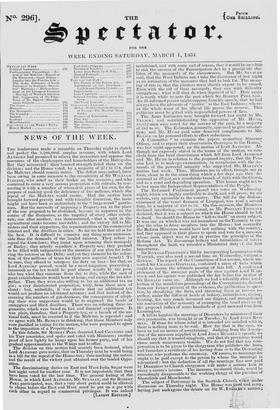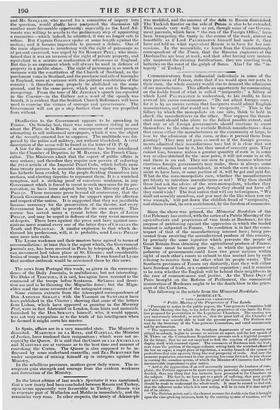NEWS OF THE WEEK.
THE landowners made a scramble on Thursday night to clutch and pocket the 1,200,0001. surplus revenue, with which Lord ALTHORP had promised to relieve the necessities and appease the murmurs of the shopkeepers and householders of the Metropolis. But they miscarried: their boasted strength failed them on the division; and the House voted, by a majority of 272 to 170, that the Malt-tax should remain entire. The defeat may, indeed, have been owing in some measure to the eccentricity of Sir WILLIAM INGILliy, who acted as their leader on the occasion ; and who contrived to cover a very serious proposition with ridicule, by con- necting it with a number of whimsical plans of his own, for the purpose of making good the deficiency of five millions, which the repeal of the Malt-tax would. create. Had the motion been brought forward gravely and with tolerable discretion, the issue might not have been so melancholy to the " large-acred" gentle- men. But the necessity of imposing a Property-tax in the place of the one proposed to be abolished, became so apparent in the course of the discussion, as the impolicy of every other substi- tute, one after another, was demonstrated,—that a split in the agricultural ranks became inevitable ; and the victory fell to Mi- nisters and their supporters, the representatives of the commercial interest and the dwellers in cities. So far we hold that all is for the best. It is difficult to conceive any thing more unreason- able than the demands of the landed interest. They refuse to repeal the Corn-laws; they insist upon retaining their monopoly of Barley; they utterly repudiate a Property-tax; they pretend to be filled with indignation at the mention of any plan for redu- cing the interest on the Debt; and yet they clamour for the reduc- tion of five millions of taxes for their own especial benefit ! To be sure, they offered to reimpose the duty on beer : but that, as Lord ALTHORP proved, would be a most iniquitous proceeding ; inasmuch as the tax would be paid almost wholly by the poor, who buy what they consume from day to day, while theinen of great establishments would brew at home, and escape the tax alto- gether. Then they were also willing to lay an additional tax on gin; a very disinterested proposition, truly, from these men of claret : but, unluckily, it was shown that au additional tax would not produce an additional revenue; and that instead of de- creasing the numbers of gin-drinkers, die consequence of adopt- ing their wise suggestion would be to augment the bands of smugglers and illicit distillers. There was no refuting these ar- guments, which were based on fact and financial experience. It was plain, therefore, that a Property-tax, or a breach of the na- tional faith, must be resorted to if the Malt-tax is repealed : and we agree with Mr. BENETT in thinking, that those Members only were justified in voting forth! motion, who were prepared to agree to the imposition of at'Peoperty-tax. In this debate, Sir ROBERT PEEL deserted Lord CHAN:Jos and his Tory associates, and spoke and voted with Ministers; another proof of how lightly he hangs upon his former party, and of his gradual approximation to the Whigs and to office. The division on this motion had scarcely been declared, when Lord ALTHORP gave notice, that on Thursday next he would bring in a bill for the repeal of the House-tax; thus marking the nature and the result of the victory just obtained over the landed Oppo- sition.
The discriminating duties on East and West India Sugar were last night voted for another year. It is not improbable that they have been voted for the last time. The general feeling of the House, in which Lord ALTHORP, Mr. STANLEY, and Sir ROBERT PEEL participated, was, that a very short period could be allowed to elapse before the East and West must be put on a par with each other in regard to commercial privile:ges. It was indeed [LATEST EDITION.]
maintained, and with some sort of reason, that it would be impolitic to risk. the success of the Emancipation Act by a precipitate abo- lition of the monopoly of the slaveowners. But Mr. STANLEY said, that the West Indians must take the discussion of last night as an intimation of the measures they had to look for. The mean- ing of this is, that the planters must shortly expect to be ruined. Even with the aid of their monopoly, they can with difficulty struggle on ; what will they do when deprived of it ? Here agaia
it is worth while to note the part which Sir Ronsorr PEEL took. An ill-informed person might suppose from his speech, that he had always been the advocate of "justice" to the East Indians; where- as the whole tenor of his official life proves the reverse. This politician must be gifted with unparalleled powers of face.
The Army Estimates were brought forward last night by Mr. ELLICE; and notwithstanding the opposition of Mr. liuNtE,
88,952 men were voted fur the service of the year, by a majority of 282 to 46. The Estimates, generally, appeared to give satisfac- tion; and Mr. Hums: paid some deserved compliments to Mr. ELLICE on his personal efforts to effect reductions.
A Committee " to examine the papers respecting Sinecure Offices, and to report their observations thereupon to the House,"
was last night appointed, on the motion of Lord ALTIIORP. Al- though not expressly stated in the terms of the motion, we con- clude from the brief observations which fell from Lord Arattorie and Mr. Humz in relation to the proposed inquiry, that the Pen- sion List is to undergo examination, in compliance with the de- mands of the powerful minority who supported Mr. HARVEY'S motion last week. Thus, Ministers are in effect, though not in form, about to do the same thing which a few days ago they de- nounced as illegal, as a scandalous breach of faith with the Crown, and as a cruel and degrading operation. This lesson ought net to be lost upon the Independent Representatives of the People. The Reformed Parliament passed two votes on Wednesday night, which are highly creditable to itself, and will prove, we are certain, very agreeable to the country. The bill for the disfran- chisement of the venal freemen of Liverpool, was read a second. time, by a majority of 100 to 38. On this occasion, the Ministers declined interfering,--on the ground, as Mr. PouLatr Tnomsom declared, that it was a subject on which the House should be left to itself. So should the House be "left to itself" on every subject. It was one on which it was not incumbent on the Treasury to em- ploy the whip to drive members into the House ; but assuredly the Reform Ministers would have lost nothing with the country, had they appeared in their places to speak and vote for a measure whose main object was to put in practice the principles of the Reform Act. To discourage bribery and intimidation of voters throughout the land, we consider a Ministerial duty of the first importance. Sir RONALD FERGUSON'S bill for incorporating Leamington with Win-wick, was also read a second time on Wednesday, without a division. The report of the Committees of last session, which un- seated Sir CHARLES GREVI L LE, contained a mass of facts which ought to insure the ultimate passing of this bill. A condensed statement of the stronger parts of the case against Lord WAR- WICK and his agents was published the day before the motion of Sir RONALD came on. Although we had a tolerably clear recol- lection of the scandalous proceedings of the Corrupti011 IS derived from our former perusal of the evidence, the publication in ques- tion, by classifying the facts, and throwing them in masses to- gether, under the different heads of bribery, intimidation, rioting, treating, &e. very much increased our disgust, and strengthened our conviction of the necessity of swamping the venal electors by the proposed influx of some hundreds of good men and true from Leamington. A bill to legalize the marriage of Dissenters by ministers of their own persuasion, was brought in on Tuesday, by Lord Jou N Rios- sELL. If those for whose relief it is intended arc satisfied with it, there is nothing more to be said. How far that is the case, we have as yet no means of ascertaining. Judging from the descrip- tion of the measure supplied in Loa JOHN RUSSELL'S speech, we should say that it wanted simplicity, and that its provisions would cause much unnecessary trouble. We do not find that any com- pensation is to be given to the clergyman who publishes the bans, and furnishes a certificate of his having done so to the Dissenting minister who performs the ceremony. Of course, no marriage-fee ought to be paid except to the person by whom the marriage is solemnized: but the deduction of all the marriage fees now paid by Dissenters to Church clergymen will make a serious hole in many a curate's income. The measure, we should think, would be exceedingly disagreeable to the working clergy of the parishes of Shoreditch and Manchester. The subject of Patronage in the Scottish Church, cal:no:under discussion on Thursday night. The House wasked.and. noisy, having just undergone the debate on Sir W. IN4;n4ic a motion; and Mr. SINCLAIR, who moved for a committee of inquiry into the question, would gladly have postponed. the discussion till another more favourable opportunity ; especially as the Lord Ad- vocate was willing to accede to the preliminary step of appointing a committee—which indeert, he admitted, it was no longer safe to refuse. But Captain GORDON spoke at some length against the motion; and it became impossible to prevent a debate. One of the main objections to interfering with the right of patronage as at present exercised, was urged by Sir ROBERT PEEL; who main- tained that it was an invasion of the right of private property, and equivalent to a seizure or confiscation of advowsons in England. But this is an argument which will always be used in defence of property in a public abuse. The right of patronage is as much at variance with the constitution of the Church of Scotland, as the parchment votes in Scotland, and the purchase and sale of boroughs in England, were at variance with the political constitution of the country : it therefore may properly be abolished on the same ground, and by the same power, which put an end to Borough- mongering. From the tone of Mr. JEFFREY S speech (as reported in the Courier—in the Gallery not a word of the speech was beard), it is evident that the Scottish Church Reformers will have need to exercise the virtues of courage and perseverance. The Government will not go a step further than they are propelled from without.

















